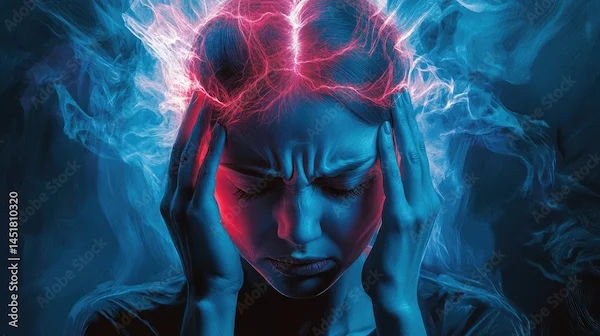Brain Fog Symptoms and Treatment: Understanding, Managing, and Overcoming Cognitive Cloudiness
Struggling with brain fog? Learn about its symptoms, causes, and effective treatments to regain focus, memory, and mental clarity.

Written by Dr.Sonia Bhatt
Last updated on 3rd Jul, 2025

Introduction
Brain fog, often described as a state of mental confusion, forgetfulness, and lack of focus, is a frustrating condition that can significantly affect daily life. Whether caused by stress, illness, or lifestyle factors, brain fog can leave individuals feeling mentally drained and disconnected from their usual abilities.
What is Brain Fog?
Brain fog is not a medical condition but rather a term used to describe a set of cognitive symptoms that affect memory, focus, and mental clarity. People experiencing brain fog often report feeling mentally "cloudy," forgetful, and unable to concentrate or think clearly. While this can be an occasional issue for many, it can also be a persistent and disruptive symptom in some individuals.
Typical descriptions of brain fog include the following feelings:
Mentally exhausted or drained
Forgetful or having trouble retaining information
Easily distracted or having difficulty staying focused
Unclear or fuzzy thinking
Low on mental energy
It’s important to understand that brain fog is not synonymous with conditions like dementia or Alzheimer’s disease. While it can be frustrating, brain fog tends to be temporary and reversible with proper management.
Symptoms of Brain Fog
Brain fog can make you feel like your brain isn’t working the way it should. You might find it harder to think clearly or remember things. Here are some common symptoms people experience:
Memory Problems: You might forget things more easily, like where you put your keys or what you were just talking about. You may also struggle to remember names or recall certain facts.
Difficulty Focusing: It can be tough to concentrate on one thing for long periods. You might get distracted more often, even with tasks you usually find easy.
Feeling Mentally Tired: Even if you’ve had a good night’s sleep, you might feel mentally drained. You may notice that your brain feels tired, and it’s harder to think clearly or get through the day.
Slower Thinking: You might notice elongated time for processing information or problem-solving.
Feeling Confused: Sometimes, brain fog can make you feel disoriented like you’re not quite yourself or can’t focus. This confusion can be unsettling and might make simple tasks feel overwhelming.
Lack of Clarity: People often describe feeling like they’re thinking through a fog. You might find it hard to make decisions or plan ahead, leaving you frustrated with your mental state.
Causes of Brain Fog
There are many possible reasons for brain fog, like lifestyle, illness, or stress. Here are some of the common causes:
Stress and Anxiety: When you’re stressed or anxious, your brain works overtime. This can lead to feelings of overwhelm and make it difficult to focus or think clearly.
Poor Sleep: You can feel mentally foggy due to poor or broken sleep. Sleep is essential for your brain to rest and recharge, so lack of it can impact memory and concentration.
Nutritional Deficiencies: If important vitamins and minerals such as vitamin B12, vitamin D, or omega-3 fatty acids, are lacking in your diet, your brain may not work at its best. These nutrients are key for brain health, and without them, you may experience brain fog.
Chronic Illnesses: Conditions like autoimmune diseases, diabetes, and fibromyalgia are linked to brain fog. When your body is dealing with a chronic illness, it can affect your brain and make it harder to focus or think clearly.
Hormonal Changes: Fluctuations in hormones, such as during pregnancy, menopause, or thyroid imbalances, can affect your brain function. These changes may leave you feeling foggy or forgetful.
Medications: Certain medications, like antihistamines or antidepressants, can cause side effects that include brain fog.
Infections or Inflammation: Infections such as flu or COVID-19, or conditions with chronic inflammation, can affect your cognitive function. For example, Post-viral brain fog is a common issue after recovery from an illness.
Mental Health Issues: Conditions such as depression or ADHD can contribute to brain fog. When your mental health is affected, it can impact your ability to concentrate, remember things, and think clearly.
Treatment and Management of Brain Fog
Since brain fog is a symptom rather than a standalone condition, treatment focuses on addressing the underlying cause, alleviating symptoms, and promoting overall brain health. Here are several approaches for managing brain fog effectively:
1. Lifestyle Modifications
Simple changes in daily habits can significantly improve cognitive function.
Improve Sleep Hygiene: Quality sleep is essential for cognitive function. Ensure a consistent sleep schedule, avoid caffeine in the late afternoon, and create a relaxing bedtime routine.
Manage Stress: Stress management techniques such as mindfulness, yoga, deep breathing exercises, and progressive muscle relaxation can help alleviate the cognitive burden of stress.
Exercise Regularly: Physical activity boosts blood flow to the brain and promotes the release of endorphins, which can enhance mood and mental clarity.
2. Nutritional Support
A well-balanced diet plays a crucial role in brain health.
Balanced Diet: A diet rich in whole foods, healthy fats, lean proteins, and complex carbohydrates provides the brain with essential nutrients. Aim for foods high in antioxidants (e.g., berries, leafy greens), omega-3 fatty acids (e.g., fatty fish, walnuts), and vitamins.
Consider Supplements: If nutritional deficiencies are identified, supplementation with vitamin B12, vitamin D, magnesium, or omega-3s may help alleviate brain fog symptoms. However, always consult with a healthcare professional before starting any supplement regimen.
3. Mental Health Support
Emotional well-being is closely linked to cognitive function.
Therapy: If brain fog is linked to mental health conditions such as anxiety or depression, therapy (e.g., cognitive behavioural therapy) can be a helpful tool for managing cognitive difficulties.
Medication: In some cases, medications may be prescribed to help manage underlying mental health conditions, hormonal imbalances, or chronic illnesses contributing to brain fog.
4. Cognitive Training and Brain Exercises
Keeping the brain engaged with stimulating activities and memory techniques can sharpen focus, enhance concentration, and reduce brain fog symptoms.
Mental Stimulation: Engaging in activities that challenge the brain, such as puzzles, reading, or learning a new skill, can improve cognitive function and alleviate brain fog.
Memory Techniques: Implementing strategies such as writing things down, setting reminders, or breaking tasks into smaller steps can assist with memory and concentration.
5. Medical Treatment for Underlying Conditions
If brain fog is due to a medical condition like an autoimmune disorder, thyroid imbalance, or chronic illness, treatment of the underlying condition is necessary. This may include medication, physical therapy, or lifestyle adjustments to manage the primary disease.
6. Hydration
Dehydration can negatively impact cognitive performance. Make sure to drink enough water throughout the day to stay hydrated, as even mild dehydration can impair memory and concentration.
When to Seek Medical Help?
While brain fog is usually temporary and manageable, it is essential to seek medical advice if symptoms persist or worsen. Experience additional symptoms, such as severe memory loss, confusion, or difficulty speaking. It may be time to consult a doctor to rule out more serious conditions, such as neurological disorders.
Conclusion
Brain fog can be frustrating, but with the right approach, you can clear the mental haze and feel more focused again. By recognising the symptoms, understanding what might be causing it, and taking steps to address it, you can improve your brain health. Whether it’s making lifestyle changes, managing stress, eating better, or seeking medical help, there are many ways to reduce brain fog and get your focus, memory, and energy back. If your brain fog is lasting a long time or is really affecting your daily life, it’s a good idea to talk to your doctor to find out what’s behind it and get the right treatment.
Consult Top Neurologists
Consult Top Neurologists

Dr. Abhinav Gupta
Neurologist
18 Years • MBBS, MD (GENERAL MEDICINE), DM (NEUROLOGY)
Ghaziabad
Bhava Neurocenter, Ghaziabad
Dr. Annakula Ramu
Neurologist
7 Years • MBBS, MD General Medicine, DM Neurology
Jagtial
Sairam Neuro and Children Hospital, Jagtial

Dr Rajashekar Mummadi
Neurologist
3 Years • MBBS, DNB General Medicine, DRNB Neurology
Hyderabad
Dr Ram's Neuro Clinic, Hyderabad

Dr. Uddalak Chakraborty
Neurologist
8 Years • MBBS, MD(GENL.MED.),DM(NEUROLOGY)
Kolkata
MCR SUPER SPECIALITY POLY CLINIC & PATHOLOGY, Kolkata

Dr Chandu Samba Siva Rao
Neurologist
7 Years • MBBS, MD GENERAL MEDICINE, DM NEUROLOGY
Vijayawada
Chandu Neuro Center, Vijayawada